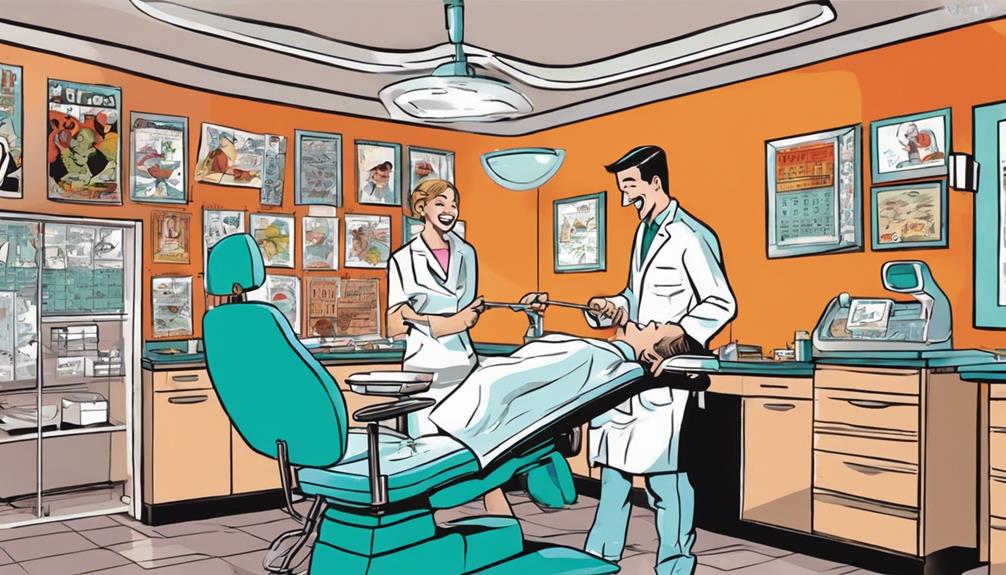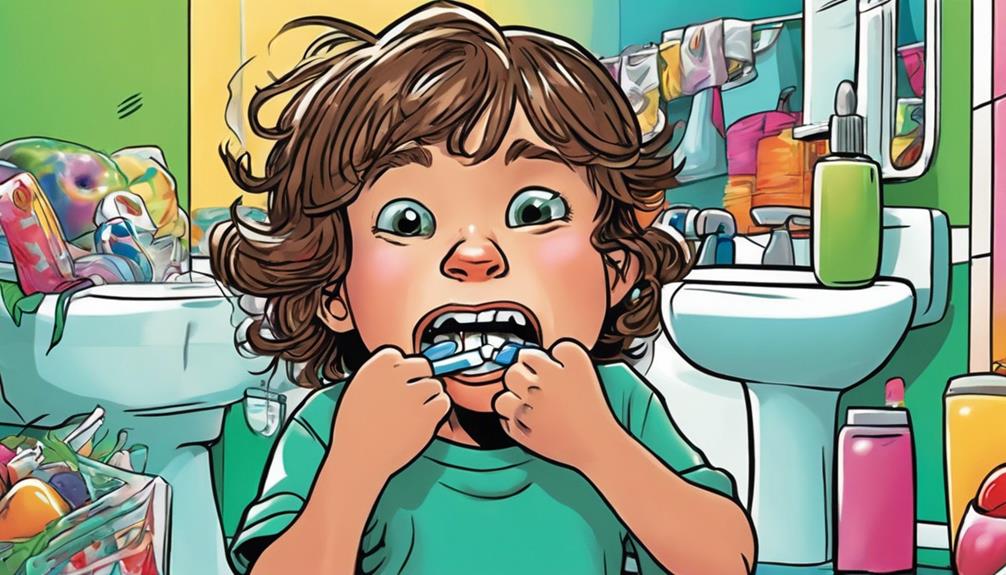You should take your kids to the dentist every six months. It might surprise you, but skipping these visits can lead to serious dental issues. About 20% of kids aged 2-5 develop cavities, and regular checkups help catch problems early. Starting dental visits around age one sets a strong foundation for good habits. These appointments include cleaning, exams, and advice on proper oral care. Ignoring dental visits increases the risk of complications later on. If you want to guarantee your child thrives with ideal oral health, there's so much more to uncover about their dental journey.
Key Takeaways
- Children should have their first dental visit by age one or within six months of their first tooth to ensure early care.
- Biannual visits (every six months) are recommended for optimal dental health and early detection of issues.
- Regular checkups help prevent cavities, with 20% of children aged 2-5 experiencing them.
- Pediatric dentists provide tailored education and support to foster good oral hygiene habits from a young age.
Importance of Regular Dental Checkups

Regular dental checkups are essential for your child's health, as they help catch cavities and gum disease early, preventing more serious issues down the road. By scheduling regular checkups and cleanings, you're investing in your child's oral health. Pediatric dentistry focuses on the unique dental needs of children, ensuring they receive the best care tailored to their age and development.
During these visits, dentists conduct thorough examinations, checking for signs of cavities or gum disease. They also perform cleanings to remove plaque and tartar buildup, which can lead to decay if left untreated. Early detection of dental issues is vital; about 1 in 5 children aged 2-5 has a cavity, making these visits even more important.
Regular checkups not only help maintain healthy teeth but also instill good oral hygiene habits from a young age. This practice can reduce anxiety about future appointments, creating a positive relationship with dental care. By prioritizing regular visits, you're setting your child up for a lifetime of healthy teeth and a confident smile.
Recommended Frequency of Visits

When it comes to your child's dental health, consistency is key.
You should aim for biannual visits to the dentist to catch any issues early and maintain good oral hygiene habits.
Missing these appointments can lead to problems that might've been easily prevented.
Ideal Visit Frequency
To maintain ideal dental health, children should visit the dentist every six months for routine checkups and preventive care. These regular checkups are essential for your child's overall oral hygiene. During these visits, the dentist performs a complete examination and cleaning, often including fluoride treatments that help keep those little teeth healthy.
If your child misses these appointments, potential issues like cavities and gum disease can go unnoticed. Early detection through consistent checkups can save your child from more extensive treatments down the road. Plus, regular visits allow the dentist to monitor your child's brushing habits and oral hygiene practices, ensuring they're on the right track.
Healthy checkups not only confirm that your child's dental care practices are effective but also lay a solid foundation for a lifetime of good dental health. By making these visits a priority, you're setting your child up for success and preventing future dental complications.
Importance of Consistency
Consistent dental visits every six months are vital for catching potential issues early and guaranteeing your child's oral health stays on track. From your child's first dental visit, establishing a routine with regular dental checkups helps monitor their dental health and development. Pediatric dentists recommend this frequency to detect cavities, gum disease, and other problems before they escalate.
During these healthy checkups, your child will receive thorough exams, cleanings, and fluoride treatments that greatly contribute to maintaining their dental health. Consistency in these visits reinforces good oral hygiene habits and helps your child feel more comfortable with dental professionals.
Moreover, regular dental checkups foster a positive relationship with pediatric dentists, which is important for instilling lifelong dental habits. When children know what to expect during appointments, they're less likely to develop anxiety about visiting the dentist in the future.
Impact of Missed Appointments
Missing dental appointments can lead to serious unnoticed problems that might affect your child's oral health long-term. When you skip regular dental visits, you risk allowing dental issues like cavities and gum disease to develop unnoticed. These problems can escalate quickly, leading to more invasive treatments later on.
Your child's first dental visit is vital for establishing a strong foundation for their dental care. Regular dental checkups every six months help monitor their growth and development, ensuring any potential problems are caught early. Consistent visits not only reinforce healthy brushing habits but also provide an opportunity for you and your child to learn effective maintenance of their dental health.
When appointments are missed, it can disrupt the preventive measures that work to keep your child's smile bright and healthy. Healthy checkups indicate that those measures are effective, considerably reducing the risk of future complications.
Prioritizing these visits is essential for maintaining your child's oral health and setting them up for a lifetime of healthy habits. Don't wait! Schedule those appointments and keep your child's teeth in top shape.
Procedures During a Dental Checkup
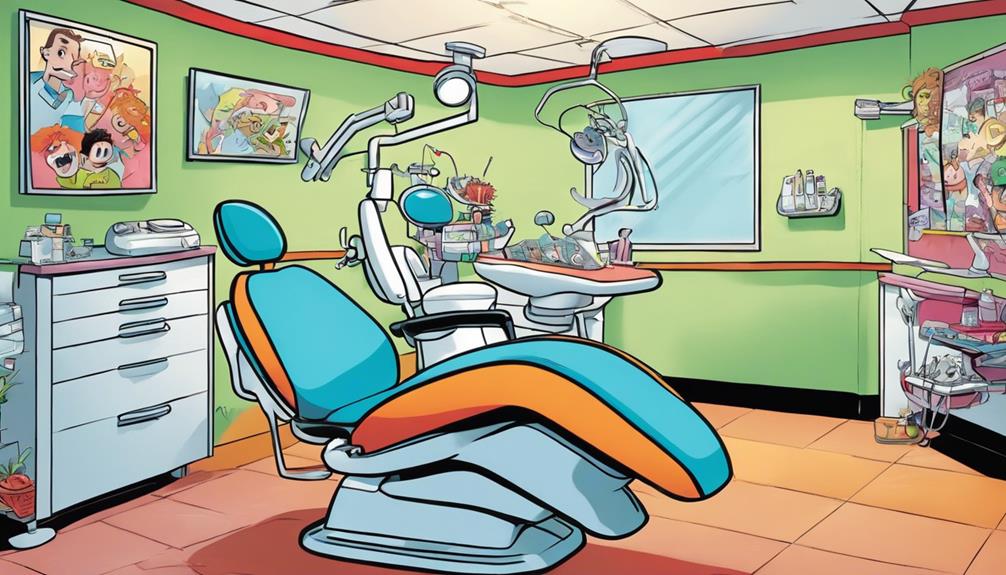
During a dental checkup, your dentist thoroughly examines your teeth, gums, and mouth to catch any potential issues early. This dental exam helps spot problems before they worsen.
You'll start with a cleaning, where the hygienist removes plaque and tartar buildup—essential for preventing cavities and gum disease. If necessary, X-rays might be taken to identify hidden cavities or impacted teeth that aren't visible during the exam.
After the cleaning, your dentist usually applies a fluoride treatment. This strengthens your child's dental health by helping to prevent tooth decay.
The dentist will also provide guidance on proper brushing and flossing techniques, ensuring your child knows how to maintain their smile at home. Additionally, they may share dietary recommendations to support healthy teeth and gums.
Significance of Early Dental Care

Recognizing the importance of early dental care can set your child up for a lifetime of healthy smiles. Scheduling that first dental visit by age one or within six months of their first tooth is essential. It not only identifies potential issues but also establishes a strong foundation for your child's dental health.
Consider these important points:
- Cavities can start early: About 1 in 5 children aged 2-5 suffers from cavities. Early dental visits help prevent these problems before they escalate.
- Fostering comfort: Regular checkups help your child acclimate to the dental environment, reducing anxiety when visiting the dentist.
- Monitoring growth: Early dental visits allow for the monitoring of your child's dental growth and development, ensuring timely intervention if needed.
- Building habits: By instilling good oral hygiene practices early, you can help your child develop habits that last a lifetime, greatly reducing the risk of cavities and gum disease.
Tips for a Positive Dental Experience

To guarantee your child's first dental visits are positive experiences, consider implementing strategies that promote comfort and ease throughout the process.
Scheduling that first dental visit by age one sets a great foundation for your child's dental health. An experienced pediatric dentist will create a welcoming environment that encourages young patients to feel safe.
Bring along a favorite toy or book—this can help ease anxiety and foster a relaxed atmosphere. Before the appointment, allow your child to explore the dentist chair and tools. Familiarity can greatly alleviate fears, making the actual visit smoother.
Praise your child for good behavior during their appointment. By rewarding them, you reinforce positive associations with dental checkups, making future visits less intimidating.
If possible, let your child observe older siblings during their dental visits. This can encourage them to feel more at ease and willing to participate in their own appointments.
Understanding Cavity Statistics

Cavity statistics reveal that about 1 in 5 children aged 2-5 has a cavity, underscoring the urgent need for proactive dental care. Tooth decay in baby teeth can lead to pain and infections, potentially affecting the development of permanent teeth. As a parent, you can't afford to overlook your child's dental health.
Consider these alarming facts:
- Early tooth decay can impact your child's ability to eat and speak comfortably.
- Pain from cavities can lead to missed school days and decreased learning.
- Severe cavities may require costly dental procedures, which can be preventable.
- Poor dental health in childhood often leads to lifelong dental issues.
Regular dental visits are essential. Scheduling your child's first dental visit by their first birthday sets the stage for good pediatric dental health. During these visits, professionals can monitor dental development and provide fluoride treatments that strengthen tooth enamel.
Establishing a routine of regular dental visits helps instill healthy habits early on, greatly reducing the likelihood of cavities in the future.
Don't wait—take charge of your child's dental health today!
Preparing for the First Dental Visit

Scheduling your child's first dental visit is an important step in ensuring their oral health and reducing any anxiety they might have about the experience. The American Academy of Pediatric Dentistry recommends doing this by age one or within six months of the emergence of the first tooth.
To help your child feel more comfortable, consider touring the dentist's office beforehand. Familiar environments can notably lessen anxiety and create a positive first experience.
At home, you can practice by encouraging your child to open their mouth wide, making the examination feel less intimidating. Utilizing children's books or videos about dental visits can also provide familiarity, easing fears of the dentist and dental tools.
These resources help demystify the process and make your child feel more at ease.
Addressing Common Dental Concerns
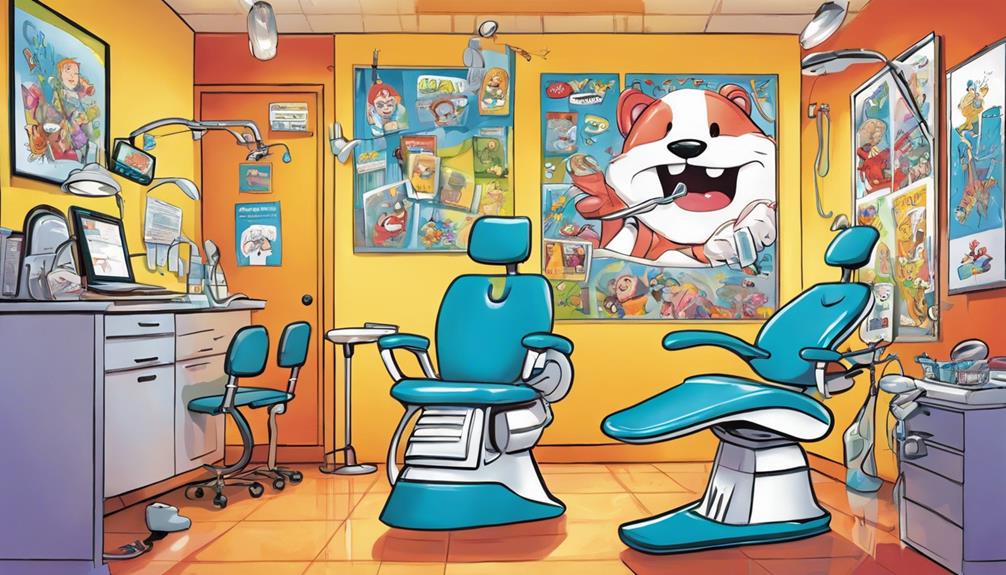
Addressing common dental concerns early can set your child on a path to a lifetime of healthy smiles. By scheduling your child's first visit by age one, you can identify potential issues like cavities before they escalate. A supportive dental environment is essential for your child's comfort and positive experiences.
Here are four common concerns to discuss with your pediatric dentist:
- Cavities: Nearly 1 in 5 children aged 2-5 has a cavity. Regular check-ups help maintain healthy teeth and prevent discomfort.
- Thumb Sucking: This habit can impact dental health if not monitored. Early intervention can guide your child towards healthier habits.
- Brushing Routines: Establishing good oral hygiene at home reduces the risk of cavities and gum disease. Encourage brushing and flossing daily.
- Dietary Habits: Discuss how diet affects oral health. Limiting sugary snacks can greatly benefit your child's teeth.
Importance of Pediatric Dentistry
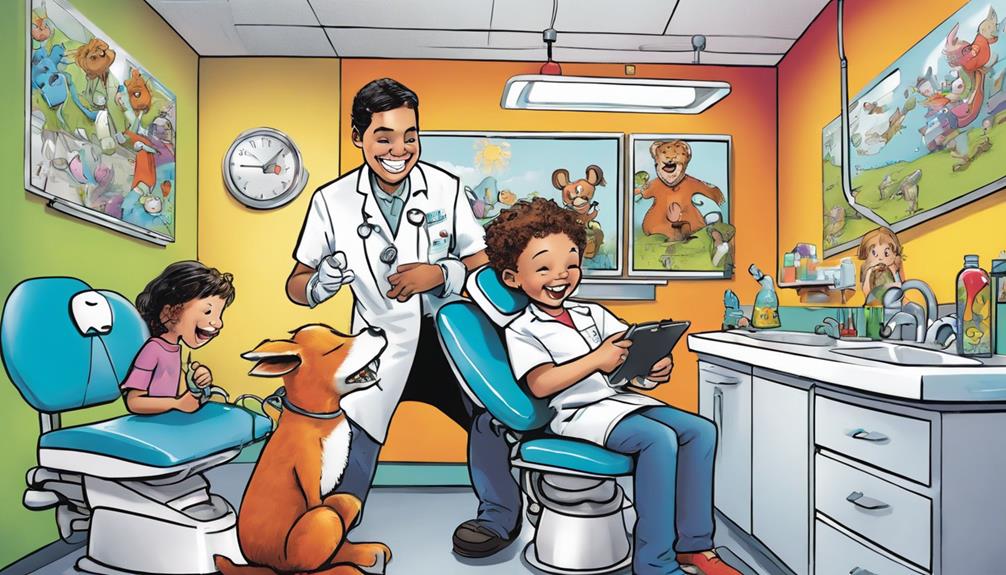
Pediatric dentistry is essential for your child's oral health, as it focuses on their unique dental needs.
By starting dental visits early, you help your child build lifelong habits that promote good hygiene and prevent issues like cavities.
Plus, a positive dental experience can reduce anxiety and encourage them to take care of their teeth for years to come.
Specialized Child Dental Care
Understanding the importance of specialized child dental care can set your child on a path to a lifetime of healthy smiles. When you prioritize pediatric dentistry, you're ensuring that your child receives the best care for their unique dental needs. Regular visits to a pediatric dentist, starting as early as their first tooth, can help monitor oral health and create positive experiences around dental care.
Here are four key benefits of specialized child dental care:
- Early Detection: Pediatric dentists identify early signs of cavities or misalignment, addressing issues before they escalate.
- Tailored Education: They provide guidance on proper oral hygiene practices that suit your child's specific needs.
- Preventive Care: Treatments like fluoride applications and sealants can protect your child's teeth and gums from decay.
- Positive Associations: Regular child's dental appointments help foster a comfort level with dental visits, reducing anxiety as they grow.
Make it a habit to visit the dentist every six months. By prioritizing specialized dental care, you're investing in your child's future oral health and promoting a lifetime of bright, healthy smiles.
Building Lifelong Oral Habits
Building strong oral habits early on is essential for ensuring your child enjoys a lifetime of healthy teeth and gums.
The American Academy of Pediatric Dentistry suggests taking your child to the dentist by their first birthday or within six months of their first tooth erupting. Early visits help identify potential issues, like cavities, and set the stage for good oral hygiene practices.
During these visits, pediatric dentists focus on creating a positive experience, which reduces anxiety around dental care. This supportive environment encourages your child to embrace regular check-ups. Additionally, dentists provide education on proper brushing and flossing techniques tailored for little ones, helping you instill these habits at home.
To further promote your child's overall health and well-being, consider incorporating some tips to help them develop a love for oral care. Make brushing a fun activity, use colorful toothbrushes, and establish a routine.
Celebrate their achievements, like mastering flossing or visiting the dentist without fear. By prioritizing these early dental visits and fostering positive habits, you're paving the way for a lifetime of healthy smiles and confidence in their oral health journey.
Frequently Asked Questions
How Often Do Kids Really Need to Go to the Dentist?
Kids need to visit the dentist every six months for checkups. This routine helps catch issues early, ensuring their teeth stay healthy. Regular appointments prevent cavities and promote good oral hygiene habits from a young age.
How Often Is Too Often to Go to the Dentist?
About 1 in 5 kids aged 2-5 face cavities, so how often is too often to visit the dentist? Generally, if you're addressing specific issues or concerns, more frequent visits can be beneficial for your child. However, for routine check-ups and preventive care, the American Academy of Pediatric Dentistry recommends visiting the dentist every six months. These regular visits can help monitor the growth and development of your child’s teeth, address any early signs of cavities or other dental issues, and provide important education and guidance on maintaining good dental health for kids. By establishing a consistent dental care routine, you can help ensure your child grows up with a healthy and happy smile.
How Often Should Children in Middle Childhood See a Dentist?
Children in middle childhood should see the dentist every six months. These regular visits help monitor their permanent teeth, prevent cavities, and establish good oral hygiene habits that'll last a lifetime. Don't skip those checkups!
Is It Neglect to Not Take Your Kid to the Dentist?
Yes, neglecting dental visits for your child is risky. Skipping appointments can lead to untreated cavities and future complications. It's essential to prioritize their oral health and establish regular dental checkups from an early age.
Is the Frequency of Dental Visits Related to the Occurrence of Cavities in Kids?
Regular dental visits are crucial for preventing reasons for child cavities. The frequency of these visits is directly related to the occurrence of cavities in kids. By having routine check-ups and cleanings, dentists can detect any early signs of decay and provide appropriate treatment to keep cavities at bay.
Conclusion
So, you thought visiting the dentist was just for adults, huh?
Well, it turns out your kid's pearly whites need just as much TLC—or maybe even more!
Regular checkups aren't just a ploy to sell toothpaste; they're essential for a healthy smile.
Who knew that those dreaded dentist visits could actually prevent cavities and save you from future drama?
Embrace the irony: the sooner you start, the less likely you'll hear, 'Mom, my tooth hurts!'




